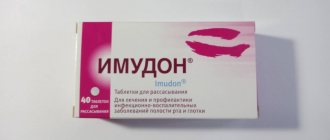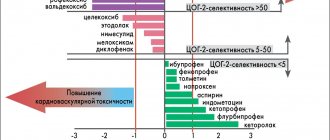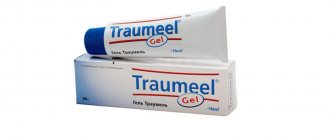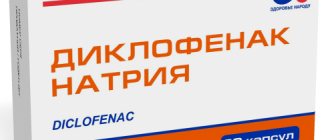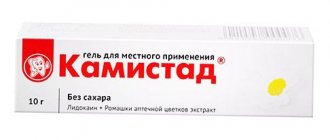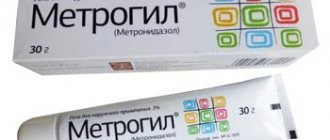Non-steroidal anti-inflammatory drugs are often used to relieve acute pain and eliminate symptoms of inflammation. Nimesil and its analogues are not first-line drugs and are recommended for use only if weaker drugs (paracetamol, diclofenac, ibuprofen) are ineffective.
According to the official instructions, Nimesil is a prescription medicine. Indications for use include moderate and severe pain of various origins (inflammatory, neurogenic, traumatic, postoperative), hyperthermia with chills, myalgia, dysmenorrhea.
Nimesil is sold in the form of a fast-dissolving granular powder, which before use must be dissolved in 150 ml of clean water to obtain an oral solution. This form of release provides the fastest possible therapeutic effect. Each sachet contains 100 mg of nimesulide, an NSAID that reduces the synthesis of inflammatory mediators such as prostaglandins, leukotrienes, and arachidonic acid. Thanks to this, it is possible to eliminate pain and reduce body temperature.
This powder is prohibited for use in the presence of such concomitant diseases as acute and chronic gastritis, duodenitis, duodenal and gastric ulcers, ulcerative colitis, aspirin-induced asthma, bleeding disorders, severe hepatic, hepatic and heart failure.
The official instructions for Nimesil provided by the manufacturer indicate that febrile fever and signs of influenza are contraindications to the use of this drug. Age limit – 12 years. The most common treatment regimen is 1 sachet as needed.
"Nimesil"
The drug is sold in the form of granules, from which you need to independently prepare a suspension for internal use. Each sachet contains 2 grams of white powder. It needs to be poured into a glass and diluted with water.
It is recommended to take 100 milliliters twice a day. Children under 12 years of age should not take the medicine. In this case, the patient’s weight must be at least 40 kilograms.
"Nimesil" has a wide range of applications:
- – inflammatory processes;
- - heat;
- – severe pain (after taking the medicine, the effect occurs very quickly).
The drug is prescribed for the following diseases:
- – migraine;
- - colds, acute respiratory viral infections;
- - toothache;
- – osteochondrosis, arthrosis, arthritis;
- – for pain after surgery;
- – vascular diseases;
- – urology and gynecology.
The drug is not addictive, so it can be used for a long period.
Elderly patients are advised to use Nimesil carefully. It is better to consult your doctor before starting use. The dosage should be selected by the doctor, taking into account the individual characteristics of the body.
- The medicine should not be combined with alcoholic beverages. Such actions may provoke unexpected results.
Inexpensive substitutes for Nimesil powder
If you need to quickly eliminate pain or fever, it is rational to use the drug in powder. This ensures high bioavailability of the drug and the fastest possible clinical effect. Sachets containing a single dose can be purchased individually at pharmacies.
Nise
Belongs to the group of non-steroidal anti-inflammatory drugs. The active ingredient is nimesulide. The chemical properties are sulfonanilide, and the mechanism is associated with blocking type 2 cyclooxygenase receptors. Indicated for the treatment of lumbago, gout attacks, arthritis of various etiologies. The drug has a fairly large number of side effects, which is associated with high hepatotoxicity, therefore it is not recommended in routine practice and is a second-line therapy.
Produced by the pharmaceutical company Dr. Reddis, India. A special feature is the presence of several forms of release:
- Sachets of granulated powder for preparing a solution, 2g;
- Enteric tablets;
- Oral suspension.
The drug can be used by children over 7 years of age with strict adherence to the instructions and constant medical supervision.
Nemulex
The drug is packaged in the Russian Federation by Sotex PharmFirma, which carries out control before sale. Raw materials based on nimesulide are produced in Romania at the Rompharm Company plant.
Release form: dry powder in the form of granules. After dissolution in water, a homogeneous suspension with a pleasant orange taste and smell is formed. The drug is used as symptomatic treatment of diseases that are accompanied by severe pain - osteochondrosis, arthrosis and arthritis, bursitis, myalgia, toothache and headache, radicular syndrome. It is prohibited to use the drug during pregnancy and breastfeeding.
Possible adverse reactions include allergies, urticaria, dizziness, drowsiness, depressed emotional state, nausea, abdominal pain.
Nimid
An anesthetic drug based on nimesulide, which is available in sachets containing 2 g of instant powder. It belongs to non-narcotic analgesics of category B, sold by prescription.
Recommended as a second-line anti-inflammatory and analgesic agent. Effectively eliminates pain of any etiology, helps reduce signs of inflammation during infection or injury.
Produced in India by the pharmaceutical company Kusum in several dosage forms that can be combined to achieve maximum effect:
- powder for suspension;
- pills;
- gel for external use.
"Nimesulide"
Available in the form of tablets, powder and gel. Tablets are sold in packs of 10, 20 or 30 pieces. You need to take 1 tablet 2 times a day. It is strictly forbidden to exceed the indicated dosage. The gel is used externally only.
Oral fungus, treatment, tablets, which is better
- Nimesulide is prescribed to reduce fever and relieve inflammation.
The drug helps with the following diseases:
- – all types of arthritis;
- – increased body temperature;
- – ARVI, cold;
- – headache and toothache;
- – pain syndrome after a bruise;
- – osteochondrosis and osteoarthrosis;
- – all types of inflammation (ligaments, tendons, soft tissues).
Even with long-term use, the drug does not cause addiction. Exceeding the dosage prescribed by the doctor is strictly prohibited. Otherwise, dangerous side reactions of the body may occur.
Elderly patients should exercise special caution when taking this medication. It is better not to use the medication without a doctor’s testimony. It is not allowed to take Nimesulide together with alcoholic beverages.
What are the similarities and what are the differences?
Nimesulide or Nimesil - are they the same thing or not? "Nimesil" and "Nimesulide" have a common active substance - nimisulide. Therefore, these drugs can be called identical. Medicines quickly and effectively eliminate pain, relieve inflammation and normalize body temperature.
However, there are some differences between the drugs, which play an important role when choosing a more suitable drug.
What is the difference between Nimesulide or Nimesil? The main difference between medications is the form of release:
- One of them is available only in granules.
- The second can be purchased in the form of gel, tablets and granules.
Indications for use also have some differences:
- Nimesil has a more limited list of indications.
- "Nimesil" has more side effects, and it must be taken within the strict limits of the prescribed dosage.
- In addition, Nimesulide has a wide list of restrictions on its use.
This must be taken into account when purchasing.
The most significant difference is the price:
- "Nimesil" can be bought for 200 rubles.
- The cost of "Nimesulide" is 60 rubles.
Most patients prefer the cheaper option.
The difference in price is due to the fact that Nimesulide is produced in Russia, and Nimesil in European countries.
Cost of Nimesil and its analogues
Nimesil is an imported drug; it is produced by several pharmaceutical companies - Laboratorios Menarini (Italy) and Fine Foods & Pharmaceutical (Spain). This is one of the first nimesulide-based drugs registered in Europe. At the moment, a large number of generics have appeared on the market, which have the same clinical effect, but have a lower cost.
| Region | The drug and its release form, price in rubles | ||||
| Nimesil in sachet No. 30 | Aponil, 20 tablets of 100 mg | Nimika 0.1 No. 20 | Nise, bags, 9 pcs. | Nemulex, granules in bags, 30 pcs. | |
| Moscow and region | 740-765 | 180-200 | 210-221 | 245-260 | 490-520 |
| Saint Petersburg | 721-796 | 175-202 | 198-216 | 230-256 | 510-521 |
| Irpen | 699-754 | 181-221 | 195-206 | 236-260 | 489-560 |
| Volgograd | 702-787 | 169-198 | 199-231 | 220-260 | 512-536 |
Adverse reactions
Both drugs can cause side effects:
- - dizziness;
- – attacks of nausea;
- - vomit;
- – excessive sweating;
- - vomit;
- – depressive state;
- – nervousness;
- – hearing and vision impairments;
- - headache;
- – asthma attacks;
- – reduction in the number of blood cells;
- - increased blood pressure;
- – tachycardia;
- – protein in urine;
- – renal and liver failure;
- – shortness of breath;
- – gastric bleeding;
- – high concentration of liver enzymes;
- – swelling;
- – problems with urination;
- – low body temperature;
- – hepatitis.
How to treat shoes against fungus at home?
Taking medications can provoke allergic rashes, bronchospasm and anaphylactic shock. At the first manifestation of such symptoms, you should urgently stop taking the drug and consult a doctor.
Which drug is better to choose?
So, which is better Nimesulide or Nimesil? After all, this is practically the same thing, or not? The choice of drug is influenced by the patient's budget and personal preferences.
- For people who do not want to pay for the brand and name of the drug, it is better to choose “Nimesulide”.
- It is also suitable for people who do not know how to independently regulate the dose of medication.
The drugs are completely identical, so you can safely buy an affordable analogue that is not inferior in effectiveness.
- The advantage of Nimesulide is the availability of different forms of release.
This factor plays an important role. Each patient will be able to choose a more convenient option.
- Some patients do not focus on price. They are ready to pay for a drug from a global manufacturer that is responsible for the quality of its product. For such people, Nimesil is more suitable. The medicine has a small list of contraindications and adverse reactions. Moreover, it is significantly more expensive than a similar drug.
Regardless of personal preferences, you should definitely consult a doctor before purchasing a medicine. Both drugs can cause side effects that can turn into serious problems later on.
Reviews
Let's listen to the reviews of doctors and patients about Nimesil and Nimesulide:
What do doctors say about drugs?
Galina Viktorovna, therapist, Kazan
Osteochondrosis of the cervical spine: symptoms and treatment
The safest and most effective medicine. Quickly relieves fever and eliminates pain. I often prescribe it to patients with pathologies of the musculoskeletal system. The medicine is also effective for gout, arthritis and myalgia. For pain relief, the drug in the form of granules is better suited. In addition, the product is sold in the form of a gel, which is used externally. The gel relieves swelling and pain in the joints. Patients regain mobility.
Grigory Leshchenko, otolaryngologist, Novosibirsk
"Nimesil" blocks pathogens of the inflammatory process, pain and fever. The drug is also effective for allergic manifestations. After taking it, blood flow improves, platelets do not stick together. The medicine is contraindicated in patients with diseases of the gastrointestinal tract. Although both remedies are effective in relieving symptoms, they do not have a therapeutic effect.
What do patients say about the drugs?
Elena 40 years old, Ufa
The doctor prescribed Nimesil to relieve fever. The medicine quickly and effectively eliminates the symptoms of colds and acute respiratory viral infections. Within 20 minutes the temperature began to drop. With her, the muscle pain and aches throughout the body went away. The drug destroys pathogenic microorganisms. The taste of the liquid is very pleasant, slightly sweet. If Paracetamol does not help, then this remedy will come to the rescue. I recommend it!
Denis, 24 years old, Saratov
Helped me with toothache more than once. One tablet of 100 milligrams is enough. Within 10 minutes the pain goes away completely. The drug can be taken for headaches, lower back pain, dislocations and muscle strains. Moreover, the medicine has a very affordable price.
Evgeniy, 44 years old, Krasnoyarsk
My back hurt badly, and after a while the pain was felt throughout my whole body. The doctor prescribed this medicine for me in the complex therapy of osteochondrosis. The product effectively relieves even the most acute pain, normalizes temperature and stops the development of inflammation. My mobility has returned.
Nimesil granules for the preparation of suspension for oral administration 100 mg/2g in bags No. 30
Name
Nimesil gran d/pr.susp d/orally 100mg/2g per pack. in pack No. 30
Description
Granules for the preparation of a suspension for oral administration in the form of a light yellow granular powder with an orange odor.
Main active ingredient
Nimesulide
Release form
Granules for the preparation of a suspension for oral administration in the form of a light yellow granular powder with an orange odor. 1 pack (2 g) nimesulide 100 mg Excipients: ketomacrogol 1000, sucrose, maltodextrin, anhydrous citric acid, orange flavor. 2 g - laminated paper bags (9) - cardboard packs. 2 g - laminated paper bags (15) - cardboard packs. 2 g - laminated paper bags (30) - cardboard packs.
special instructions
Undesirable side effects can be minimized by using the minimum effective dose of the drug for the shortest possible short course. Nimesil should be used with caution in patients with a history of gastrointestinal diseases (ulcerative colitis, Crohn's disease), since exacerbation of these diseases is possible. The risk of gastrointestinal bleeding, ulceration or perforation of an ulcer increases with increasing dose of NSAIDs in patients with a history of ulcers, especially those complicated by bleeding or perforation, and in elderly patients, so treatment should be started with the lowest possible dose. Patients receiving drugs that reduce blood clotting or inhibit platelet aggregation also have an increased risk of gastrointestinal bleeding. If gastrointestinal bleeding or ulcers occur in patients taking Nimesil, treatment with the drug should be discontinued. Since Nimesil is partially excreted by the kidneys, its dosage for patients with impaired renal function should be reduced, depending on the level of urination. There is evidence of rare cases of liver reactions. If signs of liver damage appear (itching, yellowing of the skin, nausea, vomiting, abdominal pain, dark urine, increased activity of liver transaminases), you should stop taking the drug and consult your doctor. Despite the rarity of visual impairment in patients taking nimesulide concomitantly with other NSAIDs, treatment should be stopped immediately. If any visual disturbance occurs, the patient should be examined by an ophthalmologist. The drug can cause fluid retention in tissues, so patients with high blood pressure and cardiac problems should use Nimesil with extreme caution. In patients with renal or heart failure, Nimesil should be used with caution, as renal function may deteriorate. If the condition worsens, treatment with Nimesil should be stopped. Clinical studies and epidemiological data suggest that NSAIDs, especially at high doses and with long-term use, may lead to a small risk of myocardial infarction or stroke. There is insufficient data to exclude the risk of such events when using nimesulide. The drug contains sucrose, this should be taken into account by patients suffering from diabetes mellitus (0.15-0.18 XE per 100 mg of the drug) and those on a low-calorie diet. Nimesil is not recommended for use in patients with rare hereditary diseases of fructose intolerance, glucose-galactose malabsorption or sucrose-isomaltose deficiency. If signs of a “cold” or acute respiratory viral infection occur during treatment with Nimesil, the drug should be discontinued. Nimesil should not be used simultaneously with other NSAIDs. Nimesulide can change the properties of platelets, so caution must be exercised when using the drug in people with hemorrhagic diathesis, however, the drug does not replace the preventive effect of acetylsalicylic acid in cardiovascular diseases. Elderly patients are especially susceptible to adverse reactions to NSAIDs, including life-threatening gastrointestinal bleeding and perforation, deterioration of renal, liver and cardiac function. When taking the drug Nimesil for this category of patients, proper clinical monitoring is necessary. Like other drugs of the NSAID class that inhibit prostaglandin synthesis, nimesulide can adversely affect pregnancy and/or embryo development and can lead to premature closure of the ductus arteriosus, hypertension in the pulmonary artery system, impaired renal function, which can lead to renal failure with oligodyramnia, to an increased risk of bleeding, decreased uterine contractility, and the occurrence of peripheral edema. In this regard, nimesulide is contraindicated during pregnancy and lactation. The use of the drug Nimesil can negatively affect female fertility and is not recommended for women planning pregnancy. When planning a pregnancy, consultation with your doctor is necessary. There is evidence of the occurrence in rare cases of skin reactions (such as exfoliative dermatitis, Stevens-Johnson syndrome, toxic epidermal necrolysis) to nimesulide as well as to other NSAIDs. At the first signs of a skin rash, damage to the mucous membranes or other signs of an allergic reaction, Nimesil should be discontinued. The effect of the drug on the ability to drive vehicles and operate machinery. The effect of the drug Nimesil on the ability to drive vehicles and operate machinery has not been studied, therefore, during treatment with the drug Nimesil, caution should be exercised when driving vehicles and engaging in potentially hazardous activities that require increased concentration and speed of psychomotor reactions.
pharmachologic effect
Non-steroidal anti-inflammatory drug from the sulfonamide class. Has anti-inflammatory, analgesic and antipyretic effects. Nimesulide acts as an inhibitor of the cyclooxygenase enzyme responsible for the synthesis of prostaglandins and inhibits mainly cyclooxygenase-2.
Pharmacokinetics
After oral administration, the drug is well absorbed from the gastrointestinal tract, reaching Cmax in the blood plasma after 2-3 hours. Plasma protein binding is 97.5%. T1/2 is 3.2-6 hours. Easily penetrates histohematic barriers. Metabolized in the liver using the cytochrome P450 (CYP) 2C9 isoenzyme. The main metabolite is the pharmacologically active parahydroxy derivative of nimesulide - hydroxynimesulide. Hydroxynimesulide is excreted in the bile in a metabolized form (found exclusively in the form of glucuronate - about 29%). Nimesulide is excreted from the body, mainly by the kidneys (about 50% of the dose taken). The pharmacokinetic profile of nimesulide in the elderly does not change when administered single and multiple/repeated doses. According to an experimental study conducted with patients with mild to moderate renal failure (creatinine clearance 30-80 ml/min) and healthy volunteers, the Cmax of nimesulide and its metabolite in the plasma of patients did not exceed the concentration of nimesulide in healthy volunteers. AUC and T1/2 in patients with renal failure were 50% higher, but within the pharmacokinetic range. When taking the drug again, no accumulation is observed.
Indications for use
- treatment of acute pain (back pain, lower back pain; pain syndrome in the musculoskeletal system, including injuries, sprains and dislocations of joints, tendonitis, bursitis; toothache); — symptomatic treatment of osteoarthritis with pain syndrome; - algodismenorrhea. The drug is intended for symptomatic therapy, reducing pain and inflammation at the time of use.
Directions for use and doses
Nimesil is taken orally, 1 sachet (100 mg of nimesulide) 2 times a day. It is recommended to take the drug after meals. The contents of the sachet are poured into a glass and dissolved in approximately 100 ml of water. The prepared solution cannot be stored. Nimesil is used only to treat patients over 12 years of age. Adolescents (ages 12 to 18 years): Based on the pharmacokinetic profile and pharmacodynamic characteristics of nimesulide, no dose adjustment is necessary in adolescents. Patients with impaired renal function: based on pharmacokinetic data, there is no need for dose adjustment in patients with mild to moderate forms of renal failure (creatinine clearance 30-80 ml/min). Elderly patients: when treating elderly patients, the need to adjust the daily dose is determined by the physician based on the possibility of interaction with other drugs. The maximum duration of treatment with nimesulide is 15 days. To reduce the risk of unwanted side effects, the minimum effective dose should be used for the shortest possible course.
Use during pregnancy and lactation
Like other drugs of the NSAID class that inhibit prostaglandin synthesis, nimesulide can adversely affect pregnancy and/or embryo development and can lead to premature closure of the ductus arteriosus, hypertension in the pulmonary artery system, impaired renal function, which can lead to renal failure with oligodyramnia, to an increased risk of bleeding, decreased uterine contractility, and the occurrence of peripheral edema. In this regard, the drug is contraindicated during pregnancy and breastfeeding.
Precautionary measures
Use for impaired renal function In patients with renal failure, Nimesil should be used with caution, since renal function may deteriorate. If the condition worsens, treatment with Nimesil should be stopped. The drug is contraindicated in severe renal failure (CR
Interaction with other drugs
Pharmacodynamic interactions: When used together with glucocorticosteroids, the risk of gastrointestinal ulcers or bleeding increases. When used together with antiplatelet agents and selective serotonin reuptake inhibitors (SSRIs), such as fluoxetine, the risk of gastrointestinal bleeding increases. NSAIDs may enhance the effect of anticoagulants such as warfarin. Due to the increased risk of bleeding, this combination is not recommended and is contraindicated in patients with severe coagulation disorders. If combination therapy cannot be avoided, careful monitoring of blood clotting parameters is necessary. Diuretics: NSAIDs may reduce the effect of diuretics. In healthy volunteers, nimesulide temporarily reduces the excretion of sodium under the influence of furosemide, to a lesser extent the excretion of potassium, and reduces the diuretic effect itself. The combined use of nimesulide and furosemide leads to a decrease (by approximately 20%) in the area under the congestion curve. From the respiratory system: infrequently - shortness of breath; very rarely - exacerbation of bronchial asthma, bronchospasm. From the digestive system: often - diarrhea, nausea, vomiting; infrequently - constipation, flatulence, gastritis; very rarely - abdominal pain, dyspepsia, stomatitis, tarry stools, gastrointestinal bleeding, ulcer and/or perforation of the stomach or duodenum; very rarely - hepatitis, fulminant hepatitis, jaundice, cholestasis, increased activity of liver enzymes. From the urinary system: rarely - dysuria, hematuria, urinary retention; very rarely - renal failure, oliguria, interstitial nephritis. General disorders: rarely - malaise, asthenia; very rarely - hypothermia. Other: rarely - hyperkalemia.
Storage conditions
Store in a dry place, protected from light and out of reach of children, at a temperature not exceeding 25 °C.
